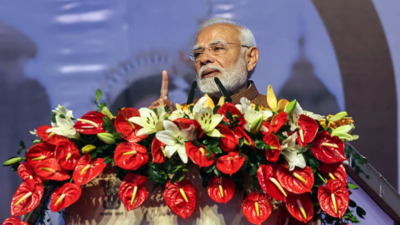NEW DELHI: Three weeks before Delhi votes, Modi government announced on Thursday the setting up of the eighth pay commission, a move that will benefit not only 1.1 crore central govt employees and pensioners, including defence personnel, but also those working in the NCT administration and other states and UTs.
The decision, which had been pending for several months, is also expected to buoy sentiments amid sagging consumption demand, with the award to be implemented from 2026.
Saif Ali Khan Health Update
“We are all proud of the efforts of all govt employees, who work to build a Viksit Bharat. The Cabinet’s decision on pay commission will improve quality of life and give a boost to consumption,” PM Modi posted on X hours after I&B minister Ashwani Vaishnaw announced getting the green light from him.
Government employees key vote bank, especially in central, south Delhi
Modi opted to announce the new panel on the eve of the polls in Delhi, which has around four lakh govt employees. In 2014, Manmohan Singh had announced the seventh pay commission at the end of Feb, weeks before general elections were announced.
The seventh pay commission saw additional expenditure of Rs 1 lakh crore during 2016-17. Effective July, the Centre is offering a dearness allowance of 53% of the basic pay or pension.
While the last panel had recommended a fitment factor of 2.57 times – increasing the salary in pay band 1 from Rs 7,000 to Rs 18,000 a month, this time govt is looking at the possibility of a further hike, sources indicated. In 2008, around the time of the global financial crisis, the UPA had opted for a fitment factor of 1.86 against the recommended 1.74, arguing that it would provide a fillip to consumption.
However, it is still early days given that Thursday’s announcement will be followed by the constitution of the pay panel, which is typically headed by a retired Supreme Court judge with retired secretaries and economists as members.
The implementation of the panel’s award is typically backed by an increase in demand for white goods, automobiles and real estate, and govt employees use the arrears and higher monthly income to indulge in purchases they often delay.
For Delhi assembly polls, especially in constituencies in central and south Delhi, govt employees are a crucial vote bank. Just a few months ago, the Centre had also tweaked the National Pension System, which requires every employee who joined from 2004 to contribute, to guarantee a pension of 50% of the last pay drawn. The Centre will make good any shortfall in case the market return is lower and has also decided to provide for inflation adjustment for those who opt for what is now called the Unified Pension Scheme from April.




